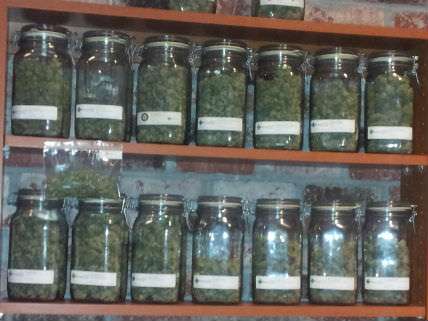Colorado Will Soon Decide the Rules for Selling Pot

This week the Colorado General Assembly, which will be in session only two more weeks this year, is considering two bills that lay the groundwork for regulation and taxation of marijuana sold by the state-licensed stores that are expected to start operating early next year. H.B. 13-1317 would transform the Colorado Department of Revenue's Medical Marijuana Enforcement Division into a more general Marijuana Enforcement Division, charged with writing regulations for the new industry by July 1, subject to the legislature's guidelines. Here are some of the major regulatory issues that would be settled by statute if the bill is approved:
- After receiving a license application, the Marijuana Enforcement Division would coordinate with the government of the municipality where the proposed business is located, making sure it complies with "local regulations governing the time, place, manner and number of retail marijuana establishments" as well as any local licensing procedure, should the municipality decide to establish one.
- Current medical marijuana centers (MMCs) would have a 90-day head start in the licensing process, with new competitors barred from applying until January. That is substantially shorter than the one-year "grace period" favored by the Amendment 64 Implementation Task Force, which was appointed by Gov. John Hickenlooper to advise the legislature on how to regulate marijuana.
- MMCs that decide to get into the recreational market would have the option of continuing to serve patients, but they would have to keep the two retail operations separate.
- Vertical integration would be permitted but not required. Marijuana stores could obtain cutivation licenses to grow their own inventory, or they could buy from growers. This approach is more flexible than the one favored by some MMCs and the task force, which recommended retaining a rule requiring stores to grow at least 70 percent of what they sell.
- Owners of marijuana businesses must live in Colorado at least two years before applying for a license, a requirement that would seem to bar out-of-state investors from getting involved in the new industry, at least if they receive equity in exchange for their money.
- Pot stores would be banned within 1,000 feet of "a school, an alcohol or drug treatment facility, the principal campus of a college, university, or seminary, or a residential child care facility." The same rule already applies to MMCs, although those operating when the restriction was enacted were exempted. If one of the listed locations began operating after a license was issued, the marijuana store would not have to move.
- Packages of marijuana products would carry labels indicating THC content, the amount of THC per serving, nonorganic chemicals used to grow the marijuana, solvents used in the extraction process, ingredients, nutritional information, an expiration date, and a warning that "there may be health risks associated with the consumption of this product."
- Customers who do not live in Colorado would not be allowed to buy more than a quarter of an ounce per transaction. It is not clear how this restriction, which is aimed at discouraging diversion of marijuana to other states, would be enforced, since Amendment 64 says the state "shall not require a consumer to provide a retail marijuana store with personal information other than government-issued identification to determine the consumer's age." (Buyers must be at least 21.) If a customer uses a passport or another form of ID that lists his date of birth but not his address, how will the seller know where he lives?
Potentially contentious issues to be settled by the Marijuana Enforcement Division include restrictions on advertising, limits on the amount of THC per serving, child-resistant packaging, and health and safety regulations for cultivation of marijuana and manufacture of cannabis-infused products.
The other marijuana bill, H.B. 13-1318, imposes an excise tax of 15 percent, as authorized by Amendment 64, on "the average market rate of unprocessed retail marijuana statewide on the date that it is sold or transferred," as determined by the Department of Revenue. The bill also imposes a special sales tax of 15 percent on marijuana products, on top of current state and local sales taxes (which total 8 percent in Denver, for example). Both taxes would have to be approved by voters in November, and the legislature would be authorized to reduce (but not increase) either rate. Although Amendment 64 says marijuana should be "taxed in a manner similar to alcohol," the impact of this double whammy on the retail price of marijuana products would be much more dramatic than the impact of state and federal alcohol taxes on the retail prices of beer, wine, and liquor.


Show Comments (21)